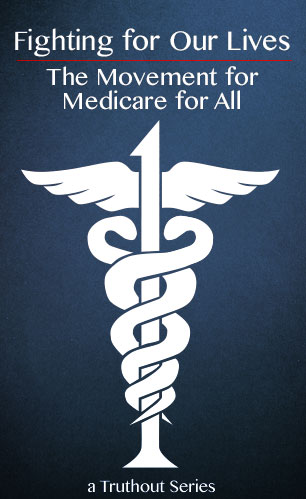
Part of the Series
Fighting for Our Lives: The Movement for Medicare for All
This piece is part of Fighting for Our Lives: The Movement for Medicare for All, a Truthout original series.
The reproductive justice movement focuses on expanding the ability of all people to access the full spectrum of reproductive health care — from contraception and cancer screenings to abortion and prenatal care. This priority is particularly urgent amid a recent onslaught of unconstitutional restrictive laws. However, reproductive justice activists know that availability means nothing if patients cannot afford to see their physicians. As Truthout has reported, a single-payer system is the only national health plan that would ensure no one falls through the cracks.
“Reproductive justice is focused on each and every person having the resources and tools to exercise agency over their sexual and reproductive lives,” Alexis Cole, policy manager at youth-focused reproductive justice organization URGE: Unite for Reproductive & Gender Equity, told Truthout.
“What we are really talking about is families — every single person must have the ability to determine what kind of family they choose to have and then be able to raise that family healthily,” Cole said. “The only way we do that is through a comprehensive, universal health plan that includes the full spectrum of reproductive health care, including abortion.”
A single-payer system that explicitly covers abortion care would override the widespread problem of state laws prohibiting abortion coverage in insurance plans.
The Medicare for All Act of 2017, introduced by Sen. Bernie Sanders, explicitly covers maternity, infant and abortion care — all of which would be huge wins for the reproductive justice movement. The Affordable Care Act (ACA) took a few steps in the right direction — requiring contraceptive coverage and zero copays for annual preventative visits — but Americans are at the mercy of their ZIP code when it comes to access. Far too many are left without reproductive care providers, or live in areas where legislatures have passed abortion restrictions. Twenty-eight states now have at least two restrictions that conflict with proven science, and 338 measures restricting abortions have been passed by legislatures between 2010 and 2017.
For those who are able to leap through every legal hoop placed in their way, the problem of payment remains. Those in marginalized communities are disproportionately affected by the impediment of cost.
“Comprehensive, universal health care would be life-changing for young people, LGBTQ folks, Black and Brown communities, and others who currently face severe inequalities in health care, especially for reproductive care,” said Cole. “A comprehensive single-payer approach would guarantee the full spectrum of reproductive health care — including abortion care — to each of these communities, instead of the current patchwork of care depending on which state you happen to live in.”
 A single-payer system that explicitly covers abortion care would override the widespread problem of state laws prohibiting abortion coverage in insurance plans. Currently, 25 states restrict abortion coverage in plans offered through the ACA exchanges, 21 states restrict abortion coverage for public employees, and 10 go so far as to restrict insurance coverage of abortion for all private insurance plans written in the state. In addition to these restrictions, the federal Hyde Amendment — which has been annually attached to the federal budget since 1976 — prevents 7.5 million low-income Americans from using their Medicaid coverage to obtain an abortion. In addition to Medicaid enrollees, Hyde affects federal civilian employees and their dependents, military personnel and their dependents, Peace Corps volunteers, incarcerated people, and those served by the Indian Health Service.
A single-payer system that explicitly covers abortion care would override the widespread problem of state laws prohibiting abortion coverage in insurance plans. Currently, 25 states restrict abortion coverage in plans offered through the ACA exchanges, 21 states restrict abortion coverage for public employees, and 10 go so far as to restrict insurance coverage of abortion for all private insurance plans written in the state. In addition to these restrictions, the federal Hyde Amendment — which has been annually attached to the federal budget since 1976 — prevents 7.5 million low-income Americans from using their Medicaid coverage to obtain an abortion. In addition to Medicaid enrollees, Hyde affects federal civilian employees and their dependents, military personnel and their dependents, Peace Corps volunteers, incarcerated people, and those served by the Indian Health Service.
Universal health coverage that ends these insurance prohibitions would be an important step toward achieving reproductive justice and freedom, Erin Grant, co-chair of the Abortion Care Network’s board of directors, told Truthout.
“Abortion coverage bans are a violation of human rights,” Grant said. “Forcing people to search for and access medical care with limited options for paying for services complicates their ability to take care of themselves and families in a timely, dignified manner.”
As Truthout has reported, support for true universal health care is growing, with 120 co-sponsors for Rep. John Conyers’s single-payer bill in the House and 16 co-sponsors for Sanders’s bill in the Senate. Similarly, despite loud detractors in the GOP and conservative wing of the Democratic Party, support for abortion access has risen as well. Rep. Barbara Lee’s Equal Access to Abortion Coverage in Health Insurance Act of 2015 was co-sponsored by 127 members — a full 30 percent of the House.
Voter support for abortion coverage is also at an all-time high. According to a June 2015 poll by Hart Research Associates, 74 percent of voters — which includes 62 percent of Republicans — agree that “as long as abortion is legal, the amount of money a woman has or does not have should not prevent her from being able to have an abortion.” When asked specifically about prohibitions on abortion coverage for Medicaid enrollees, 65 percent of voters agree with the statement: “[W]e do not always know a woman’s circumstances — we’re not in her shoes. When Medicaid covers pregnancy care but withholds coverage for abortion, we’re taking away a low-income woman’s ability to make important, personal decisions based on her circumstances.”
Local referenda and recent elections support this data.
“Election Day 2017 was a referendum on the regressive policies of Donald Trump, and we heard voters say in a resounding voice, ‘enough is enough,'” Andrea Miller, president of the National Institute for Reproductive Health said in a statement on November 7. “Access to abortion care, health care for low-income people, and the rights of the LGBTQ community, people of color and immigrants were all on the ballot yesterday, and we saw voters ready to push back against the Trump agenda, and forward on a progressive vision for cities, states and this country.”
New Jersey voters elected reproductive health supporter Phil Murphy to the governor’s office over opponent Kim Guadagno, who campaigned on defunding Planned Parenthood. In Washington State, Manka Dhingra won her special election to the state Senate with a platform including reproductive freedom. And in Maine, voters struck back against conservative Gov. Paul LePage’s refusal to expand Medicaid coverage. Through a referendum to grant Medicaid access to an estimated 70,000 low-income residents, the measure won by a nearly 20-point margin.
“We’re seeing a nation that is angry about the path the federal government and many states are leading us down and motivated to reclaim our power and change the direction we are moving [in],” Miller said. “These victories mean that we have the opportunity to continue to advance policies that safeguard access to abortion, contraception and all reproductive health care.”
“Economic and racial injustice are inextricably linked, and so we know that expanded health care access through single-payer would have a huge impact on communities of color.”
As reproductive justice advocates seek to build on these victories, we are acutely aware of the systemic inequalities that single-payer specifically would address in a way that other reforms like the ACA and proposed “public option” efforts never could.
Nan Little Kirkpatrick, executive director of the Texas Equal Access Fund, told Truthout that the reproductive justice movement is about more than contraception and abortion care.
“Single-payer would improve health care access overall, especially for the most underserved and under-resourced communities — and this will impact people’s reproductive decision making,” said Little Kirkpatrick. “Here in Texas, we have the highest maternal mortality rate [35.8 deaths per 100,000 live births] in the US — a nation that itself has an extremely high maternal mortality rate. Expanded access to health care could counteract this epidemic, which we see disproportionately impacting Black women in particular.”
The US has the highest rate of maternal mortality in the developed world, with 26.4 deaths per 100,000 live births overall — nearly three times that of the next closest country (the UK at 9.2). That’s approximately 700 deaths from pregnancy-related complications. As Little Kirkpatrick referenced, these overall numbers mask significant racial disparities. According to the Centers for Disease Control and Prevention (CDC), the rate for pregnancy-related deaths is 12.7 deaths per 100,000 live births for white women and 43.5 deaths per 100,000 live births for Black women. Thanks to systemic, multigenerational inequalities, Black women are three and a half times more likely to die as a result of pregnancy.
“People of color are disproportionately impacted by barriers to health care access, leading to issues like high maternal mortality and a disproportionate lack of access to reproductive health services,” said Little Kirkpatrick. “In the United States, economic and racial injustice are inextricably linked, and so we know that expanded health care access through single-payer would have a huge impact on communities of color. When we talk about reproductive justice, these disparities in access for communities of color [are] part of that conversation.”
All of the reproductive justice leaders that spoke with Truthout referenced these disparities, and the need for truly equitable coverage, as well as access.
“Universal health care would be one step in addressing the inequality of health care resources across communities, giving each of us the basic health care needed to make personal, fundamental decisions about our health, sexuality and family lives,” said Cole.
Grant also cited Abortion Care Network’s efforts to support all people who want to become pregnant. Many people who want to parent don’t have adequate health care coverage for assisted reproductive technology options.
“Inclusive and competent preventive health services are a human right, and reproductive justice and freedom depend on access to these services regardless of income, gender or zip code,” she said.
Grant added that insurance expansion is not the only issue facing reproductive justice advocates.
“Even with the increased access that would come with universal coverage, we still need to make sure that there are enough providers to see patients and that services are provided respectfully and without bias, coercion or unnecessary delays. Affordability is not the only thing that keeps people from getting the care they need — that’s one reason it’s so important to keep clinics open and to train the next generation of providers.”
As Grant, Cole and Little Kirkpatrick point out, the list of needs may be long, but ensuring that every person, regardless of income, background, gender, or ZIP code can see a doctor when they need to would go a long way to accomplishing the goals of the reproductive justice movement.
Before Midnight: Last Chance to Have Your Gift Matched!
Before midnight tonight, all donations to Truthout will be matched dollar for dollar up to $15,000! Thanks to a generous supporter, your one-time gift today will be matched immediately. As well, your monthly donation will be matched for the whole first year, doubling your impact.
We have just a few hours left to raise $15,000 and receive the full match.
This matching gift comes at a critical time. As Trump attempts to silence dissenting voices and oppositional nonprofits, reader support is our best defense against the right-wing agenda.
Help Truthout confront Trump’s fascism in 2026, and have your donation matched now!